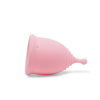Menstruation is a natural and normal part of a woman's life, yet it can often come with its fair share of challenges. From physical discomfort to emotional fluctuations, navigating through menstruation can sometimes be a daunting task. However, with the right knowledge and a few helpful tips, you can make your menstrual cycle a more manageable and empowering experience. In this blog post, we bring you the best menstrual tips to help you stay healthy, happy, and in control during that time of the month.
- Maintain a Balanced Diet: Eating a well-balanced diet is crucial for overall health, and it becomes even more important during your menstrual cycle. Focus on consuming nutrient-rich foods such as fruits, vegetables, whole grains, lean proteins, and healthy fats. Incorporating iron-rich foods like spinach, lentils, and red meat can help combat fatigue and replenish iron levels lost during menstruation. Additionally, increasing your intake of magnesium-rich foods like bananas, nuts, and dark chocolate may alleviate menstrual cramps.
-
Stay Hydrated: Drinking an adequate amount of water is essential to keep your body hydrated and support overall well-being. Proper hydration can also help reduce bloating and ease menstrual symptoms like headaches and fatigue. Aim for at least 8-10 glasses of water per day, and consider herbal teas or natural fruit-infused water for added variety and flavor.
-
Exercise Regularly: While it might be tempting to curl up on the couch with a hot water bottle, engaging in regular physical activity can actually help alleviate menstrual discomfort. Exercise releases endorphins, which act as natural painkillers and mood boosters. Opt for low-impact exercises like walking, yoga, or swimming, which can enhance blood circulation and reduce cramps. Remember to listen to your body and choose activities that you enjoy.
-
Practice Self-Care: During your menstrual cycle, it's essential to prioritize self-care. Take time for yourself and engage in activities that help you relax and unwind. This could include reading a book, taking a warm bath, meditating, or practicing deep breathing exercises. Find what works best for you and make it a regular part of your routine.
-
Track Your Menstrual Cycle: Keeping track of your menstrual cycle can provide valuable insights into your body's patterns and help you anticipate and manage symptoms more effectively. Use a menstrual tracking app or a simple calendar to note the start and end dates of your period, as well as any symptoms or changes you experience. This information can be useful for understanding your hormonal fluctuations, planning ahead, and identifying any irregularities that may require medical attention.
-
Use Menstrual Products That Suit You: With a wide range of menstrual products available, finding the one that suits your needs and preferences is essential. Whether you prefer pads, tampons, menstrual cups, or period panties, choose products that provide comfort, reliability, and safety. It's also important to follow proper hygiene practices and change your products at regular intervals to prevent any infections or discomfort.




Leave a comment